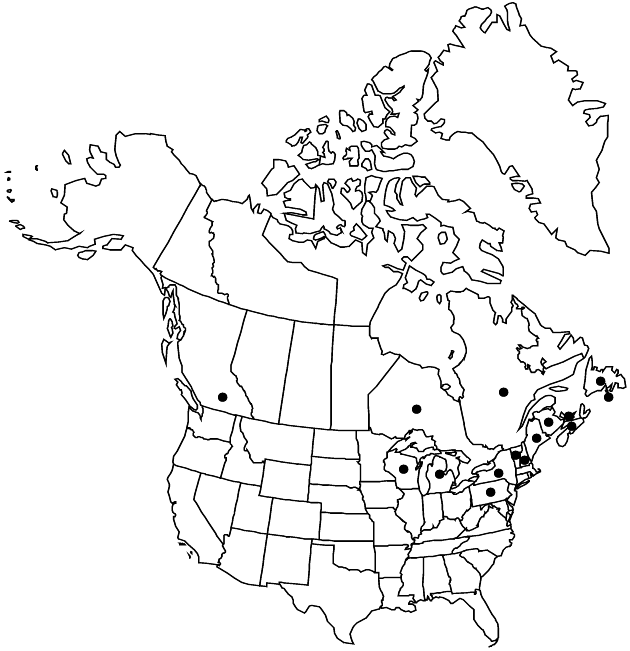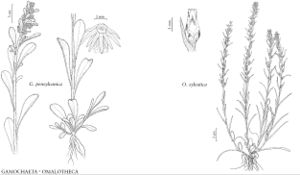Difference between revisions of "Omalotheca sylvatica"
in F. W. Schultz, Arch. Fl., 311. 1861.
FNA>Volume Importer |
FNA>Volume Importer |
||
| Line 27: | Line 27: | ||
|elevation=10–500 m | |elevation=10–500 m | ||
|distribution=St. Pierre and Miquelon;B.C.;N.B.;Nfld. and Labr. (Nfld.);N.S.;Ont.;P.E.I.;Que.;Maine;Mich.;N.H.;N.Y.;Pa.;Vt.;Wis.;Europe;Asia (Caucasus;Iran;Siberia). | |distribution=St. Pierre and Miquelon;B.C.;N.B.;Nfld. and Labr. (Nfld.);N.S.;Ont.;P.E.I.;Que.;Maine;Mich.;N.H.;N.Y.;Pa.;Vt.;Wis.;Europe;Asia (Caucasus;Iran;Siberia). | ||
| − | |discussion=<p>The circumboreal Omalotheca sylvatica may have been introduced from Eurasia (Frére Marie-Victorin 1995). Omalotheca alpigena (K. Koch) Holub and O. caucasica (Sommier & Levier) S. K. Cherepanov were treated as synonyms of O. sylvatica by A. J. C. Grierson (1975); they have been recognized as distinct species in other treatments.</p> | + | |discussion=<p>The circumboreal <i>Omalotheca sylvatica</i> may have been introduced from Eurasia (Frére Marie-Victorin 1995). <i>Omalotheca</i> alpigena (K. Koch) Holub and O. caucasica (Sommier & Levier) S. K. Cherepanov were treated as synonyms of <i>O. sylvatica</i> by A. J. C. Grierson (1975); they have been recognized as distinct species in other treatments.</p> |
|tables= | |tables= | ||
|references= | |references= | ||
| Line 51: | Line 51: | ||
|publication year=1861 | |publication year=1861 | ||
|special status= | |special status= | ||
| − | |source xml=https://jpend@bitbucket.org/aafc-mbb/fna-data-curation.git/src/ | + | |source xml=https://jpend@bitbucket.org/aafc-mbb/fna-data-curation.git/src/8f726806613d60c220dc4493de13607dd3150896/coarse_grained_fna_xml/V19-20-21/V19_727.xml |
|tribe=Asteraceae tribe Gnaphalieae | |tribe=Asteraceae tribe Gnaphalieae | ||
|genus=Omalotheca | |genus=Omalotheca | ||
Revision as of 15:14, 18 September 2019
Plants 10–70 cm. Leaves basal and cauline; blades 1-nerved, linear to narrowly oblanceolate or lanceolate, 2–8 cm × 2–10 mm, distal cauline smaller, linear, faces bicolor, abaxial gray, silvery sericeous, adaxial green, glabrescent. Heads (20–90) in loose, spiciform (leafy-bracteate, interrupted) arrays (4–35 cm, occupying 1/3–5/6 plant heights, simple or branched at bases, primary axes mostly visible). Involucres campanulo-turbinate, 5–6.5 mm. Phyllaries some or all with conspicuous dark brown spot distal to middle. Cypselae cylindric to fusiform, minutely strigose; pappus bristles basally connate, falling together. 2n = 56.
Phenology: Flowering Jul–Sep(–Oct).
Habitat: Open woods, boggy woods, rocky slopes, clearings, fields, borders of woods, roadsides, muddy banks, disturbed sites
Elevation: 10–500 m
Distribution

St. Pierre and Miquelon, B.C., N.B., Nfld. and Labr. (Nfld.), N.S., Ont., P.E.I., Que., Maine, Mich., N.H., N.Y., Pa., Vt., Wis., Europe, Asia (Caucasus, Iran, Siberia).
Discussion
The circumboreal Omalotheca sylvatica may have been introduced from Eurasia (Frére Marie-Victorin 1995). Omalotheca alpigena (K. Koch) Holub and O. caucasica (Sommier & Levier) S. K. Cherepanov were treated as synonyms of O. sylvatica by A. J. C. Grierson (1975); they have been recognized as distinct species in other treatments.
Selected References
None.
